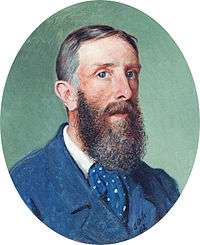George Dunlop Leslie
| George Dunlop Leslie | |
|---|---|
|
Self-portrait (1882) | |
| Born |
2 June 1835 London |
| Died | 21 February 1921 (aged 85) |
| Nationality | British |
| Elected | Royal Academy |
George Dunlop Leslie RA (London 2 July 1835 – 21 February 1921) was an English genre painter, author and illustrator.
Life and work
Leslie was born into an artistic family, his father was the notable genre painter Charles Robert Leslie RA, and his uncle Robert Leslie was a marine artist. He studied art first at Cary's Art Academy, then from 1854 at the Royal Academy. His first exhibition at the Academy was in 1859, and he showed his work every year thereafter. He became an Associate (ARA) in 1868 and a full Royal Academician (RA) in 1876.
George Dunlop Leslie lived early on in St John's Wood (London), and was part of the St John's Wood Clique, a group of artists who favoured light-hearted genre subjects. From 1884–1901 he was resident at "Riverside", St. Leonard's Lane, Wallingford, Oxfordshire. His sister Mary Leslie (1833–1907), also an artist, lived at "Cromwell Lodge" next door. Fellow artist, James Hayllar, was also a resident of the village and they painted a portrait of Queen Victoria together for her Golden Jubilee in 1887.[1] From 1906 he lived at "Compton House" in Lindfield, Sussex
His early works, such as Matilda (1860)[2] showed the strong influence of the Pre-Raphaelites, but he settled into a more academic, aesthetic, style of painting with the aim of showing "pictures from the sunny side of English domestic life". He often used children as subjects and his work was praised by John Ruskin for its portrayal of the "sweet quality of English girlhood".[3] One of his pictures, This is the Way we Wash our Clothes was used as a poster in an advertising campaign for soap. Despite its apparently trivial subject matter, however, Leslie's work was highly regarded by critics of the time.[4]

Leslie was also an author and had several books published. Our river (1888), Letters to Marco (1893) and Riverside letters (1896) were all illustrated by him in black and white, and based on personal observations of life and nature in his local area. He also wrote a history of the early years of the Royal Academy - The inner life of the Royal Academy.
Leslie was married to Lydia. They had a daughter Alice (depicted in his painting Alice in Wonderland) and a son Peter Leslie (1877–1953) who was also an artist.[1] Amongst Leslie's artistic friends and acquaintances were Sir Edwin Landseer, Frederick Walker and Henry Stacy Marks.
In June 2000, The daughters of Eve,[5] considered to be one of Leslie's finest paintings, and which had hung unnoticed for 40 years in a south Wales school (Llantarnam Comprehensive), was sold for £170,000 to a private collector. The money raised was used to fund much needed building work to the school.[6]
Work
- Sun and Moon Flowers
This picture was painted in 1890, from one of the windows of the artist's drawing-room at Wallingford, looking out over the garden to the meadow on the opposite bank of the river. According to Dunlop: "I arranged the two girls by the window. One is seated on a stool on the ground, and the other is on the seat of the deeply recessed window. The whole was painted direct from nature. A young lady friend posed for one of the figures, while .. the other is from Kitty Lambert, a favourite model of mine. The two girls are arranging sunflowers in a vase. In the picture some of the sunflowers are the usual bright yellow ones, and others, which I call moonflowers, are far paler. It is painted on canvas, very simply..."
Books
| Wikimedia Commons has media related to George Dunlop Leslie. |
- Our River (Bradbury, Agnew & Co., 1888).
- Letters to Marco (Macmillan and Co., 1893).
- Riverside letters; a continuation of "Letters to Marco" (Macmillan and Co., 1896).
- The inner life of the Royal Academy, with an account of its schools and exhibitions principally in the reign of Queen Victoria (John Murray, 1914)
References
- Citations
- 1 2 "G D Leslie". Sites.google.com. Retrieved 2014-07-26.
- ↑ Mathilda.
- ↑ G D leslie (Mid Sussex Times, May 2003).
- ↑ Cowling, Mary, Victorian figurative painting: domestic life and the contemporary social scene (Papadakis Pub. 2000) pp. 51 ff.
- ↑ Hermes (2010-02-23). "The Daughters of Eve". Goldenagepaintings.blogspot.com. Retrieved 2014-07-26.
- ↑ School painting worth £200,000 (BBC News - 31 March 2000)
- Bibliography
- Taylor, Tom. G. D. Leslie ARA, from English painters of the present day (London, Seeley, 1871).
- Chesterton, G. K. Famous Paintings, Volume 1 (Cassell, 1913), no. 28.
- Waters, Grant M. 'Dictionary of British Artists Working 1900-1950' (Eastbourne Fine Art, 1976).
External links
- G D leslie online (ArtCyclopedia)
- Paintings by Leslie (Art Renewal Center Museum)
- Dunlop's paintings of children ("Children in art history)
- Works depicting Wallingford
- Matilda (1860 painting)
- Alice in Wonderland (1879 painting)
- In the Wizard's Garden (1904 painting)
- In a convent garden (painting, n.d.)
- The Deserted Mill (1906 painting)
- Photo of Leslie (National Portrait Gallery)
